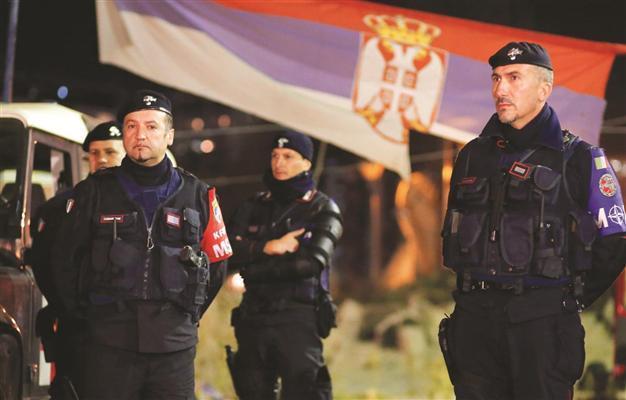Violence and low turnout mar key local elections in Kosovo
MITROVICA, Kosovo - Agence France-Presse

Italian Carabinieri, who are members of the NATO Kosovo Force (KFOR), stand in front of a Serbian national flag as they secure the main bridge in Mitrovica. REUTERS photo
Outbreaks of violence and a low turnout marred key local elections in Kosovo on Nov. 3, the first in which ethnic Serbs have been encouraged to vote since the country proclaimed independence in 2008.One woman was seriously injured when masked extremists stormed a polling station, attacking voters and election commissioners and destroying ballot boxes in the ethnically divided town of Kosovska Mitrovica, Belgrade-backed Serb mayoral candidate Krstimir Pantic told reporters.
Polling stations in the Serb-run northern part of the town closed an hour before the official close of voting as a result of the violence.
There were also outbreaks of violence at several other polling stations, another candidate Oliver Ivanovic said.
“The vote was interrupted by violence... it is clear that the elections in northern Kosovska Mitrovica have failed and probably will be declared invalid,” Ivanovic said. The Organization for Security and Cooperation in Europe (OSCE), which had a key role in organizing the polls in northern Kosovo, said it was withdrawing its staff from the town.
“The security of our staff was compromised and we decided to remove all our staff,” spokesman Nikola Gaon said. The election of deputies and mayors in 36 Kosovo municipalities is being watched closely by Brussels as a test of relations between Pristina and Belgrade after a historic EU-brokered deal in April to normalize ties. Serbia rejects Kosovo’s independence, but has openly backed the polls, urging the minority Serb community in the country to vote and have their say in Pristina-run institutions.
Calls for boycott
The participation of Serb voters is seen as crucial to the poll’s success. There are some 120,000 ethnic Serbs living in Kosovo, some 40,000 of who live in the north, where they make up the majority and enjoy control over some public institutions. Serbia’s prime minister, Ivica Dacic, said participation in the election is in the interest of the Serb people in Kosovo. “Let us once do something that is in our interest and not in the interest of our enemies,” Dacic said.
“The fate of Serbs in Kosovo should be in their own hands, and not (Kosovo Prime Minister Hashim) Thaci’s or the extremists’.”
Many Serbs have expressed concern that voting in the election would give legitimacy to the Kosovo government.
Serb hardliners in the north have actively campaigned for a boycott of the polls and there were reports of voter intimidation. “Some groups are not allowing voters to cast their ballots,” said Valdete Daka
of Kosovo’s central election commission.
One supporter of the boycott, Igor Vojinovic, said refusing to vote was “the only way to save the Serb state” in northern Kosovo. “These elections serve only to implement the Brussels accord, which is a betrayal of the Serb people,” Vojinovic said.
EU foreign policy chief Catherine Ashton has called the elections “a key moment in Kosovo’s future and an important element in the process of normalization of relations between Kosovo and Serbia.” Kosovo, the territory which sparked a war between Serb forces and ethnic Albanian rebels in 1998-1999, remains the main stumbling block to Serbia’s bid to join the European Union.
The April deal with Pristina helped Serbia secure the green light to begin membership talks with Brussels, and holding up its end of the accord is vital for Belgrade. For Kosovo, a free and fair vote with a significant Serb turnout would be a positive step in its own push for negotiations on an EU membership bid.
Kosovo’s independence is recognized by most EU states. Preliminary results are expected to come out tomorrow.
















